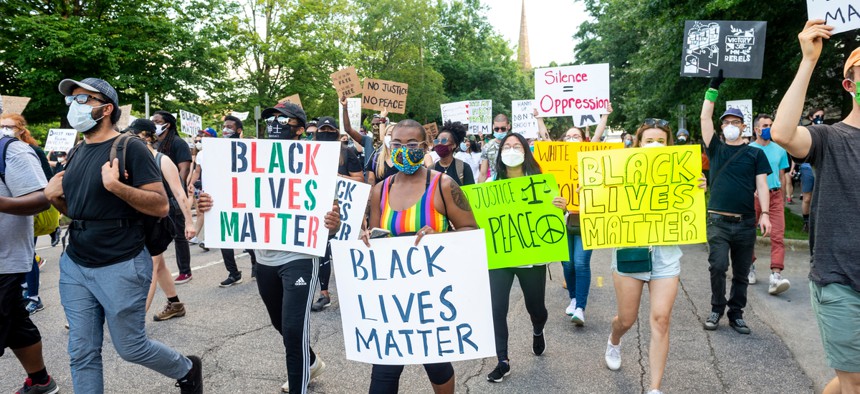In One State, a Racial Equity Task Force Suggests 100 Ways to Change the Criminal Justice System

Protesters in Raleigh, North Carolina in May 2020. Shutterstock
North Carolina’s task force released a sweeping report calling for changes in policing and the courts.
A North Carolina task force focused on improving racial equity in the criminal justice system this week released a report with 125 recommendations to make widespread changes within law enforcement, the court systems and other agencies.
The report focuses heavily on suggestions for how to reshape policing, especially in instances where officers are more likely to interact with communities of color, particularly Black residents of the state. Black drivers, for instance, are twice as likely to be pulled over as white drivers in the state—so the task force recommends reducing the amount of time officers spend on traffic stops and requiring them to get written, informed consent before they search any vehicle.
“Today’s report is a next step towards the actions that North Carolina must take to end racial disparities in the criminal justice system, not the final word,” said Associate Justice Anita Earls, who sits on the state Supreme Court and served as co-chair of the Task Force for Racial Equity in Criminal Justice.
Many of the recommendations are familiar after a summer marked both by protests around the country over Black people killed by police officers and by local governments’ responses to those demonstrations. The task force suggests minimizing the “militaristic presence” of the police during protests, boosting the power of civilian review boards to oversee officer complaints, and tracking officers fired for excessive force to ensure they can’t be rehired by other agencies.
The report also takes aim at state and local court systems. Suggestions for improving trials and sentencing include eliminating cash bail for most misdemeanors, expanding jury pools to make them more diverse, establishing an independent unit to review past convictions, and ending the state’s reliance on fines and fees.
“North Carolina can reimagine public safety to provide accountability for victims and safety for communities without the grotesque racial disparities that manifest in so many ways in our criminal justice system,” wrote the task force co-chairs, Earls and state Attorney General Josh Stein. “These disparities represent families separated, opportunities limited, and outcomes prejudged … While the problems may seem vast, intractable, and multi-dimensional, the system built up by decisions large and small over many years can be changed.”
The task force was created by Gov. Roy Cooper in a June executive order The group includes members of the state justice department, state lawmakers, representatives from several reform and advocacy organizations, judges, police chiefs, prosecutors and public defenders. They were tasked with evaluating everything from law enforcement training to the impact of fines and fees.
Members of the task force, who will work together until 2022, said that they hope many of the recommendations will be implemented soon given the bipartisan support for criminal justice reform in the state. Earlier in the year, the Republican-led legislature passed several reform measures also supported by Cooper, a Democrat.
Of the task force recommendations that need the approval of the state legislature, decriminalizing marijuana possession up to 1.5 ounces and exploring possible legalization of the drug likely faces one of the most difficult battles. The state is one of 14 that hasn’t approved medical marijuana usage and local political observers say lawmakers are unlikely to change drug laws anytime soon.
But many of the recommendations in the report can be implemented piecemeal by individual state and local agencies or police departments without the involvement of the state legislature. For example, the state department of public safety could implement a suggestion to provide incarcerated parents with parenting classes and set up “meaningful visitation with their children.” Another suggestion to require psychological screenings of officers before they can be hired necessitates an administrative rule change by the North Carolina Sheriffs’ Education and Training Standards Commission.
The North Carolina Sheriffs’ Association released its own policy recommendations recently, saying their report was “an effort to create a law enforcement profession that will not tolerate racism and excessive force by law enforcement.” Some of the suggestions overlap with the task force’s report, including reforms to chokehold policies, but others show the disagreements about reworking law enforcement practices.
The Sheriffs’ Association rejected some task force recommendations, including strengthened citizen review boards, reduced use of school resources officers for disciplinary measures, and a requirement that the state be involved in investigating all uses of force that result in a civilian’s death.
Emma Coleman is the assistant editor for Route Fifty.
NEXT STORY: Nation Sees Troubling Rise in Fatal Cocaine Overdoses






